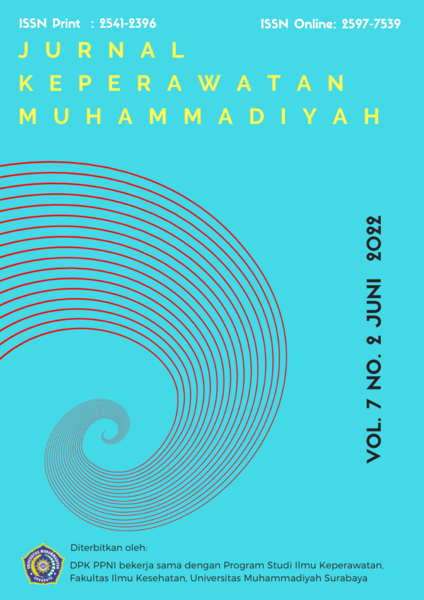Manajemen Diri Pasien Diabetes Mellitus Tipe 2 terhadap Kadar Gula Darah: Eksperimental Study
DOI:
https://doi.org/10.30651/jkm.v7i2.11724Keywords:
Blood Sugar Levels, Self-Management of Type 2 DM Patients, Type 2 Diabetes MellitusAbstract
Objective: Â This study to determine the effect of self-management of Type 2 DM patients on blood sugar levels.
Methods: The method of this study used a quantitative  This study used a quasi-experimental design with pre post test without control group. A total of 23 patients with Type 2 DM become as respondents with a sampling technique used purposive sampling. The inclusion criteria applied to respondents included age more than 35 years, received a diagnosis of Type 2 DM from a doctor since at least 2 years ago, is currently active in treatment, and is willing to participate in the full course of the study. The measuring instrument used is a checklist sheet containing data on blood sugar levels before and after self-management of Type 2 DM patients. Pre and post measurements were given 1 month. Data were analyzed using McNemar Test.
Results: Â Â There is an effect of self-management of Type 2 DM patients on changes in blood sugar levels (p value 0.008).
Conclusion: Â Â Self-management of Type 2 DM patients has been shown to improve DM control, especially in controlling blood sugar in the body. Self-management carried out by patients with Type 2 DM in this study was seen to be optimal in aspects of diet regulation, physical activity regulation, and taking medication regularly.References
Decroli E. Diabetes melitus tipe 2. Padang; Pusat Penerbit Bagian Ilmu Penyakit Dalam Fakultas
Kedokteran Universitas Andalas; 2019.
Fatimah RN. Diabetes melitus tipe 2. Jurnal Majority. 2015;4(5): 93–101.
Huzaimah N. Model psikoedukasi untuk meningkatkan pemahaman dan efikasi diri
penderita diabetes mellitus tipe 2. Wiraraja. 2018;8(1):19-26
International Diabetes Federation (IDF). Diabetes atlas. Sixth edition. 2013. Epub ahead of print.
p. 1-160
Kholifah SN. Self management intervention sebagai upaya peningkatan kepatuhan pada
penderita DM. J Ners. 2014; 9(1): 143-50
Kusnanto K, Sundari PM, Asmor CP, Arifin H. Hubungan tingkat pengetahuan dan diabetes self-management dengan tingkat stres pasien diabetes melitus yang menjalani diet. J
Keperawatan Indonesia. 2019;22(1):31-42
Kusumadewi MD. Peran stresor harian, optimisme dan regulasi diri terhadap kualitas
hidup individu dengan diabetes melitus tipe 2. Psikoislamika - J Psikol dan Psikol Islam. 2011;8:43–61.
Laili N. Hubungan diabetes self-management dengan kualitas hidup pasien diabetes mellitus
tipe 2 di RS Amelia Pare Kediri. J Ilmu Keperawatan Stikes Hang Tuah Surbaya. 2017;
:1077-83
Rahman HF, Yulia Y, Sukarmini L. Efikasi Diri, kepatuhan, dan kualitas hidup pasien diabetes
melitus tipe 2 (self efficacy, adherence, and
quality of life of patients with type 2 diabetes ). e-Jurnal Pustaka Kesehat. 2017;5:108–13.
Wang CM, Inouye J, Davis J, Wang CY. Diabetes knowledge and self-management effects on physiological outcomes in type 2 diabetes. Nurs Forum. 2013;48(4):240-7.
Warsito BE. Peningkatkan kemampuan pasien dalam self manajemen. Prosiding Seminar Nasional Keperawatan " Pengembangan Self Management pada Pelatanan Kesehatan".
:6-10. ISSN 978-602-5560-81-1
Worang V. Hubungan pengendalian diabetes mellitus dengan kadar glukosa darah pada pasien diabetes mellitus di RSUD Manembo Nembo Bitung. Manado: Fakultas kedokteran universitas Sam Ratulangi Manado;2013
Downloads
Published
Issue
Section
License
- Penulis tetap memegang hak atas karyanya dan memberikan hak publikasi pertama kepada jurnal ini yang secara simultan karya tersebut dilisensikan di bawah:Â Creative Commons Attribution-ShareAlike 4.0 International (CC BY-SA 4.0)













